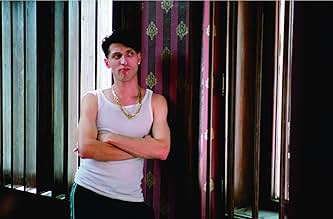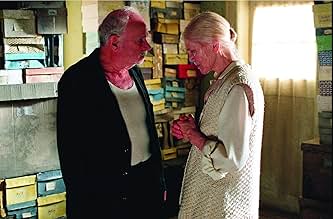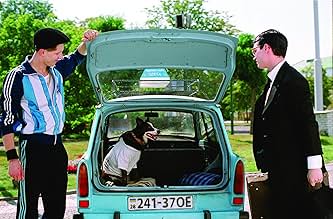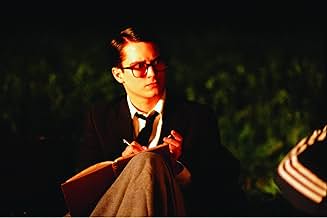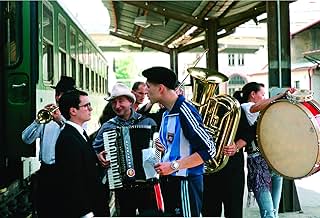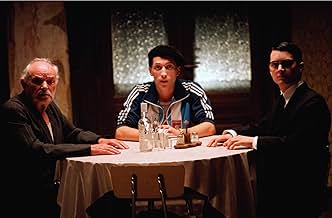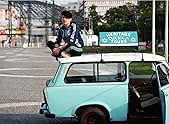Un giovane ebreo americano cerca di trovare la donna che ha salvato suo nonno durante la seconda guerra mondiale in un villaggio ucraino, che alla fine è stato raso al suolo dai nazisti, con... Leggi tuttoUn giovane ebreo americano cerca di trovare la donna che ha salvato suo nonno durante la seconda guerra mondiale in un villaggio ucraino, che alla fine è stato raso al suolo dai nazisti, con l'aiuto di un eccentrico locale.Un giovane ebreo americano cerca di trovare la donna che ha salvato suo nonno durante la seconda guerra mondiale in un villaggio ucraino, che alla fine è stato raso al suolo dai nazisti, con l'aiuto di un eccentrico locale.
- Regia
- Sceneggiatura
- Star
- Premi
- 7 vittorie e 6 candidature totali
- Grandfather
- (as Boris Leskin)
- Ukrainian Band Member
- (as Sergej Rjabcev)
- Ukrainian Band Member
- (as Jurij Lemeshev)
Recensioni in evidenza
Debut director/adapter Liev Schreiber retains some of the humor and language clashes of the novel, mostly through the marvelous Eugene Hutz as the U.S.-beguiled Ukrainian tour guide. He is so eye-catching that the film becomes more his odyssey into his country and his family as he goes from his comfortable milieu in sophisticated Odessa to the heart of a cynical, isolated land that has been ravaged by conquerors through the Communists and now capitalists, with both Jews and non-Jews as detritus. As funny as his opening scenes are when he establishes his cheeky bravura, we later feel his fish-out-of-waterness in his own country when he tries to ask directions of local yokels.
Shreiber uses Elijah Wood, as the American tourist, as an up tight cog in a visual panoply, as his character is less verbal than as one of the narrators in the book. He and Hutz play off each other well until the conclusion that becomes more sentimental in this streamlined plot. Once the grandfather's story takes over in the last quarter of the film, marvelously and unpredictably enacted by Boris Leskin, the younger generation does not seem to undergo any catharsis, as they just tidy up the closure.
Schreiber does a wonderful job visualizing the human urge to document history. One of his consultants in the credits is Professor Yaffa Eliach and her style of remembering pre-Holocaust shtetl life through artifacts clearly inspired the look and it is very powerful and effective.
The Czech Republic stands in for the Ukraine and the production design staff were able to find memorable symbols of change in the cities, towns and countryside, as this is now primarily a road movie, and the long driving scenes do drag a bit. Schreiber retains some of the symbolism from the book, particularly of the moon and river, but having cut out the portions of the book that explain those, they just look pretty or ominous for atmosphere and no longer represent time and fate.
As W.C. Fields would have predicted, the dog steals most of his scenes for easy laughs. In general, Schreiber does go for more poignancy than the book. It is irresistibly touching, especially for those who haven't read the book, but less morally and emotionally messy.
The film is enormously uplifted by its marvelous soundtrack, which ranges from songs and instrumentals from Hutz's gypsy band to traditional tunes to contemporary tracks to Paul Cantelon's klezmer fusion score.
This is not a Holocaust film per se, being a kind of mirror image of "The Train of Life (Train de vie)" as about memory of a time that is freighted with meaning now, but will resonate more with those who have an emotional connection to that history.
Liev Schreiber makes his directorial debut with a playful angst usually associated with his acting ethos. When successful actors decide to sit in the director's chair, we usually get a biographical glimpse at the souls beneath the acting mask- Check. We usually get a mishmash of genres- Check. But what we normally do not get is an insightful original film which is credible, intelligent and moving.
Elijah Wood plays Jonathan, an inquisitive young boy who collects pieces of life as he goes. He is on a mission to find a woman in a photograph. The sepia picture bears his grandfather (an uncanny resemblance to him) and the woman. To aid his journey he enlists the help of travel guides that comprise of a Hip-Hop loving break-dancer, Alex (Eugene Hutz), his apathetic and perma-vexed grandfather (Boris Leskin) and his dog- Sammy Davis Junior Jr! What ensues is essentially a comedy. There is an un-patronisingly simple introduction with voice-overs. Alex's is especially funny as he educates his younger brother on the year 1969, proving how popular he is with the chicks and break-dancing thus setting him up as Jonathan's antithesis.
Schreiber begins to break down the characters as they progress and the comedy acts as an intentional veil to what is a story about three people linked to the holocaust who do not really know themselves. All three hold the film with tenderness and authenticity something Schreiber was unlikely to get wrong and as enchanting and fantastical as the film is, the horrors that are allowed to crack through, i.e. the past are presented in an almost palatable tone (incidental music, cinematography) which make them all the more unsettling.
As the unlikely group finally find the town they seek they learn of the true atrocities that occurred and find out a lot about who they really are.
Elijah wood is as authentic as usual, bringing his usual innocence and strength to the screen. Formally a resident good in Lord of the Rings and a resident evil in Sin City he plays Jonathan with aplomb as he is bombarded with culture shocks and a quest for truth. Boris Leskin as the grandfather also delivers his angst and frustration at the youths with great humour and conviction as his own past is unravelled. However, it is Eugene Hutz as Alex that makes the show. The director using that old trade of translation misunderstandings to create and maintain a humour that is actually funny and not gimmicky.
Schreiber has delivered an enchanting debut that has both heart and soul. The continuous score and beautiful photography creates a fairy tale haze around a story about identity, truth and family. If there was a complaint, it would be the speed at which the film changes direction; though this could have been intentional it may not sit well with all. Nevertheless this is a sterling effort that delivers great comedy and bonding between an unlikely group while dissecting another aspect of the horrors of World War 2 in a completely fresh fashion.
-Chi&Ojo
There is indeed plenty of humor: eccentric, un-subtle, sometimes somewhat twisted humor: the kind of humor I generally find very appealing indeed. But most of the humor is the kind that appears conscious at all times of things deeply serious, deeply sensitive, even deeply painful. The movie weaves together themes of Past and Present, Perception and Truth, Memory and Activity, Life and Death. The entire movie is suffused by the history of European anti-Semiticism in general, and of the Holocaust in particular.
How can Humor and Horror be combined in the same movie? The review I saw suggested that the humor is Absurdist. I don't think this is the case at all; at least not in the common sense. Instead, I think this movie stands in the tradition of much Jewish / Yiddish literature and theatre. I don't claim to be any kind of expert in this area; but from what I've seen, Humor is used, in this cultural context, both as a coping tool for the horribly tragic experiences of this people; and also Humor is used as a means of "recovering the Divine" for men and women who choose a path of Faith rather than a path of either Despair or Absurdism. See "Fiddler on the Roof" for Humor used in both ways in this rich tradition.
Elijah Wood (Jonathon) Wood wears horn rimmed glasses that really make him look, well, strange: compare Sin City when he wore the same kinds of glasses with chilling effect. In this movie, it's easy to see how the glasses become a metaphor for both his Search and for his Struggle between Perception and Truth. Eugene Hutz (Young Alex) and Boris Lesking (Old Alex) are both really just wonderful. Jonathon and Young Alex are from the same generation, yet seem so very, very different; and then find that they are not so different after all. And the way in which the Apparent Narrative Voice changes gradually from that of Jonathon to that of Young Alex .. as a journey of intended discovery for Jonathon becomes one of discovery for both Young Alex and Old Alex ... is to me so very moving.
There are some wonderful scenes and panoramas from (I'm told) Prague and environs, standing in for the Ukraine of the story line. All feels very authentic and seems to give a wonderful sense of place; although I've never been myself to the Ukraine and can hardly testify to this from first hand experience.
All in all, if you're looking for light comedy, I would not recommend this movie at all. On the other hand, if you are interested in a wonderful, delightful, and deeply moving film, please, check out this wonderful movie.
For those who haven't watched the film, perhaps you should stop reading here.
Jonathan is a collector. His love for his grandparents is boundless. He watches as his grandfather dies and as his grandmother is on what appears to be her death bed. On a clear moment, this dying woman gives Jonathan a picture and an amber ornament for his collection. Watching the photograph, taken a long time ago, a young couple are seen together. Watching makes Jonathan think it shows the grandfather and his girlfriend, taken on happier times. Watching the snapshot seems to be the motivation for this intense young man to go looking for his ancestors' past in the Ukraine.
Jonathan has made arrangements with a travel agency, Heritage Tours, of Odessa for his trip to Trochenbrod, the mythical place where his grandfather came from. The agency is handled by an older man, who claims to be blind, and his grandson, Alex, a man who loves the pop American culture that has captured his imagination, as well as his contemporaries in the country. Alex speaks a kind of English no one speaks and his conversation and translation, for Jonathan's benefit are hilarious to our ear for the use of sometimes unheard English terms. The old man insists in taking his dog, Sammy Davis Jr., against the wishes of Jonathan, who doesn't want to sit next to the snarling and barking animal during the trip.
As they embark in search of Trochenbrod, it's clearly that his companions, especially the old man has no clue where he is going. At this point, the film becomes a road movie, as the three characters riding the back roads of the country become more acquainted with one another. As the trio arrive at the sunflower field with the house at the end, it indicates they have indeed come to the right place. Some places are a clear reminder of the conflicts of the past.
The older woman, living in the isolated place, is the missing link of the story. She is able to put things into the right perspective. But here is where the story changes its emphasis from Jonathan, who clearly has come to the land of his ancestors, to the old man. We watch as this older man starts remembering things about himself. This, in turn, changes the dynamic of the film as we discover how connected Jonathan and his guides have been all the time.
Some criticism in these pages have expressed opinions about the accuracy of the story, which after all, it's a work of fiction and liberties have been taken. It would have been impossible to make another film including so much that is contained in the book. The great way the film is divided into different chapters is a clever way to let the viewer know what's about to be seen.
Elijah Wood, a magnificent film actor, does an excellent work by underplaying Jonathan. Mr. Wood makes one of his best appearances in any film with his interpretation of the main character. The felicitous casting of Eugene Hutz as Alex, the Ukranian tour assistant and translator, seems to be an idea made in heaven. Mr. Hutz is about the best thing in the film. His arcane usage of English gives the film a funny angle that delights the viewer. Boris Leskin as Alex's grandfather and driver of the tour car makes a valuable contribution to the film, as well as Laryssa Lauret, who is seen in the last part of the movie.
The excellent cinematography of Matthew Libatique brings the splendor of the Czech Republic's countryside in all its magnificence. The musical score by Paul Cantelon is heard in the background adorning the film in ways that it adds a richness to the movie.
Above all, this is a triumph for Liev Schreiber, the first time director that will surely go far in whatever he decides to do next.
Lo sapevi?
- QuizEugene Hutz's band Gogol Bordello appears as the polka band that greets Elijah Wood at the train station.
- BlooperWhen the Grandfather repeatedly sounds the horn of the car, he presses the middle of the steering wheel to do so. In the Trabant, the horn is activated by pushing the signal light lever forward.
- Citazioni
Alex: I have reflected many times upon our rigid search. It has shown me that everything is illuminated in the light of the past. It is always along the side of us, on the inside, looking out. Like you say, inside out. Jonathan, in this way, I will always be along the side of your life. And you will always be along the side of mine.
- Curiosità sui creditiSeveral songs are credited to the New York punk/Gypsy/Jewish klezmer band, Gogol Bordello, which is led by Eugene Hutz, who plays Alex in the film (the same band greets Jonathan when he arrives on the train). The last of these songs, "Start Wearing Purple (For Me Now)," which plays over the end credits, is credited to both a correct spelling (Gogol Bordello), dg and Gogol Bodello, an incorrect spelling.
- ConnessioniFeatured in Today: Episodio datato 24 novembre 2005 (2005)
I più visti
Dettagli
- Data di uscita
- Paese di origine
- Sito ufficiale
- Lingue
- Celebre anche come
- Everything Is Illuminated
- Luoghi delle riprese
- Aziende produttrici
- Vedi altri crediti dell’azienda su IMDbPro
Botteghino
- Budget
- 7.000.000 USD (previsto)
- Lordo Stati Uniti e Canada
- 1.712.337 USD
- Fine settimana di apertura Stati Uniti e Canada
- 66.806 USD
- 18 set 2005
- Lordo in tutto il mondo
- 3.601.974 USD
- Tempo di esecuzione1 ora 46 minuti
- Colore
- Mix di suoni
- Proporzioni
- 1.85 : 1


